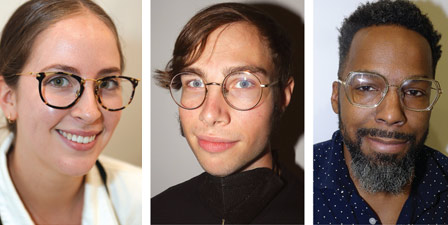
What's really at stake?
By Kristen SpinaWhen Barry Santini’s controversial L&T cover story in the February issue noted that technical advances may soon make online refraction a reality, a large number of readers demanded to be heard. We took the debate to the 20/20&U blog, asking if online refraction will be better or worse for eyecare professionals and their patients. Nearly 80 commenters chimed in with valid concerns and often heated opinions.
Self-administered online refraction is clearly a thorny subject, and when—not if—it comes to pass, says Santini, the industry will have to move beyond heated debate and take steps to prepare patients and staff for what will surely be a significant change in the way eyecare is delivered.
 Most commenters were quick to agree on the notion that there is more to an eye exam and quality eyecare than refraction. Says Susan R. Fertig: “How will Patient A receive adequate care for the health of their eyes? How will glaucoma, cataracts and various retinopathies be diagnosed? In my opinion, there are too many ‘what ifs’ for something of this nature to be practical in application.”
Most commenters were quick to agree on the notion that there is more to an eye exam and quality eyecare than refraction. Says Susan R. Fertig: “How will Patient A receive adequate care for the health of their eyes? How will glaucoma, cataracts and various retinopathies be diagnosed? In my opinion, there are too many ‘what ifs’ for something of this nature to be practical in application.”
Frank J. Weinstock, MD, agrees: “The numbers don’t tell the whole story. They must be interpreted—there may be the first sign of cataracts, diabetes and many other conditions. The numbers may be correct, but to not see the ophthalmologist may be disastrous.”
Indeed, many voiced similar opinions. The primary concern seems to be that if refraction were left in the hands of consumers many would develop a false sense of security and the eyecare professional’s role could be minimized. “We have to do more to help the public understand the value of their eye examination, glasses and everything having to do with vision,” says Eric Rollins. “Tim Fortner of Transitions gives the example that Americans spend 10 times as much money for cable TV than they do for eyecare on average. It is an obvious step backward to have online refractions, just like it would be [an obvious step backward] to have patients fill out an online survey for their annual physical and call that ‘good.’”
And though the value of the eye exam is at the center of this debate, the bigger issue is clearly focused on how changes to the status quo will impact the bottom line. Most industry professionals fear the inherent lack of control that would stem from any kind of do-it-yourself component here, yet consumers have been self-diagnosing for decades.
As Santini points out, the widespread availability of contact lens fulfillment online [without respect for Rx expiration dates or periodic exams] and the general acceptance of over-the-counter reading glasses are two examples of how consumers are currently able to bypass the eyecare professional.
Says Jo: “Does anyone take their health seriously anymore? How can we compare buying a pair of jeans online with a pair of eyewear prescribed for a person to have proper vision?” Jo maintains that people are forgoing annual eye exams and placing about as much value on their eyesight as they would on a designer purse or a golf set.
It’s clear many of our blog readers agree. David Barlia asks, “What’s next? Online colonoscopies?”
Disbelief—or fear—aside, a number of commenters were quick to realize that like it or not, this day will come. And the industry needs to figure out intelligent ways to educate consumers or run the risk of losing market share. Says Dr. Jim: “You can measure your own blood pressure and access Dr. Google. Does that mean you’re a GP? Some people think yes, [but] the majority [of people] still utilize the services of their GP. We will still need ophthalmologists, optometrists and opticians.”
“The truth is the responsibility has to be put back on the three O’s who have allowed insurance companies to control their patient base and how they view patients because they control how much they get paid,” says R. Williams.
But whether eyecare professionals scoff at the technology, blame the insurance companies or take it upon themselves as an industry to lead and direct the discussion, there’s little doubt that the consumer will have the final say in this story. Because it’s not about shortcuts or convenience, or saving/making money; it’s about trust. Patients who try and are unhappy with online refraction, says Santini, will be back. “And this time, they’ll have an apostle-like commitment to spreading the word about who in their neighborhood is delivering excellence worth paying for.”
Nancy agrees: “Anyone who is getting a quality exam and customer service wouldn’t be interested. OK, maybe once, but they’ll be back.”
“There is no doubt we as the three O’s have brought a lot of this on ourselves by all the mixed messages we send out,” says George Dakli, ABOC, who goes on to cite examples of eyecare professionals making claims or suggestions that are confusing to patients, such as MDs who recommend over-the-counter readers or eye surgeons who claim patients “will never need glasses again.”
Santini brought up the same point in his cover story: “ECPs continue to send out a bag of mixed messages that undermine the importance of obtaining the best vision. For example, while we stress the importance of regular eye checkups for all and take pride in delivering accurately fabricated eyewear, we also advise people with small vision errors—those in and around 0.00D—that they don’t really need glasses.”
Says Rick Trexler, RVT, ABOC: “I don’t know that there is a single right answer and there certainly is not one that will satisfy everybody... Do we need to get rid of the arbitrary ‘expiration’ dates on refractions? Do we need to allow duplication of lenses? Should we back affordable refractions by opticians in the absence of a thorough exam as opposed to refractions by lay personnel in optometrists’ and ophthalmologists’ offices coupled with a thorough exam?”
In the final analysis, there is more at stake here than whatever issues online refraction may bring to the table. But the idea of presenting a united front, educating consumers and finding ways to embrace new technology will go a long way toward ensuring future success—for everyone. ■













